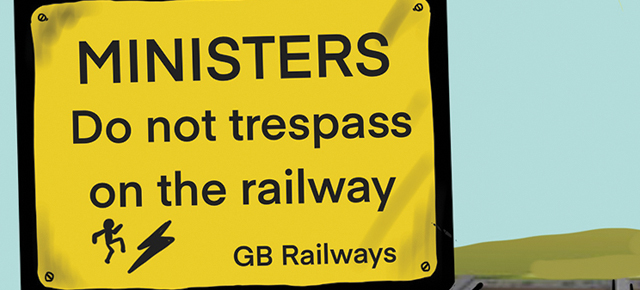Our Whitehall insider imagines what’s going on inside the minds of the mandarins at Great Minster House, home of the DfT
When I listened to the Transport Select Committee take evidence on our Rail White Paper the other week, I was hoping to hear some information on how, exactly, the reforms proposed are going to be implemented. I came away somewhat disappointed. What struck me most about this session was how all the witnesses were clear that implementing the proposals was going to be hard work, would take time, or, to quote that esteemed railway journalist, Nigel Harris, it’s all going to take “nerves of steel over the next few years because there will be tricky waters to navigate”. Quite.
We’re told there’s going to have to be a major change of culture, both from Network Rail and this department, and that’s not going to be easy. Indeed, changing cultures built up over many years is perhaps the hardest thing of all. Will this department be able to stop meddling in the day-to-day activities of the railway? Will Network Rail really be able to become a more collegiate organisation, fully embracing the aspirations and agendas of combined authorities and local transport authorities in the way the White Paper says is so necessary? Or will it remain very much the command and control organisation of the past? Network Rail is already a very large organisation and Great British Railways is set to be larger still, as I pointed out in my last column. I just wonder how easy it is to transform cultures in organisations as big as this. I really do wish Sir Peter Hendy and Andrew Haines, the current chair and CEO of Network Rail respectively, who will oversee the creation of GBR, all the very best in this huge endeavour.
I thought that Andy Bagnall, the director general of the Rail Delivery Group, put a brave face on the reforms as he tried to persuade the committee that the private sector really did have an important role to play in the future of the railways, describing the reforms very much as a public/private partnership. Actually, at one level he’s right. The ‘private sector’ will run the trains. But so far as I can see that’s about all it will do – and that’s pretty much all it’s done for some time now. But since much of the ‘private sector’ running our train services are actually state-owned, foreign organisations, I think it is stretching a point to say the ‘private’ sector has a major role to play. However, if the private sector really is allowed to come up with investment proposals which it can fund and finance then we certainly will have a material contribution from it in the years to come, but I’m yet to be persuaded this will happen in any meaningful way.
I wonder if ministers will be able to stop themselves from interfering. It’s a dilemma that has always existed of course, but let’s see if ministers can, in future, really stick to the good intentions of standing back
Actually, I am not saying there’s anything wrong with the current balance between public and private. As Sir Peter Hendy has pointed out, the travelling public don’t much care whether the services they use are publicly or privately owned. They just want the services to do what they say on the tin. And this, I think, gets to the heart of the matter. Our secretary of state was trying to tell the Transport Select Committee that central to his reforms was the objective to get trains to run on time. At least, that was my take on what he was, fundamentally, saying lay behind the proposals.
We would all say “Amen” to that. But it’s far from clear to me why these proposals will make trains run on time more than they did before. If there are signal failures trains can’t run on time, no matter how well integrated track and train is. And let’s remember – and I make no apology for sounding like a stuck record – the biggest cause of delays to services is problems with the infrastructure not with the actual train operations themselves. These reforms won’t change that.
A critical aspect of these reforms is the intention that this department steps back from its day-to-day oversight of the railways. Or, to quote Nigel Harris again, yes, set up a new specialist body “and let it get on with it”. Can we really do this? The problem – which I see as a fundamental fault line in all of this – is that ministers are ultimately accountable to parliament for the performance of the railways because so much taxpayer’s money is ploughed into it. This is unavoidable. But the moment railway performance dips or hits a rocky patch (and, trust me, it will) and MPs start baying for blood and demanding ministers “do something about the railways” (and, trust me, they will) I wonder if ministers will be able to stop themselves from interfering. It’s a dilemma that has always existed of course, but let’s see if ministers can, in future, really stick to the good intentions of standing back. I’m not holding my breath.
For More Great Minister Grumbles – CLICK HERE.
This article appears inside the latest issue of Passenger Transport.
DON’T MISS OUT – GET YOUR COPY! – click here to subscribe!









